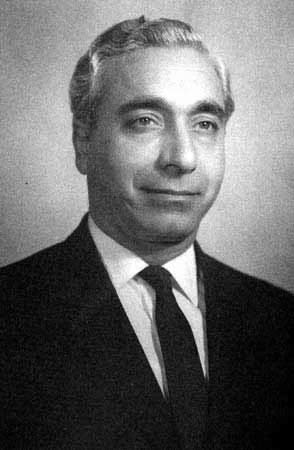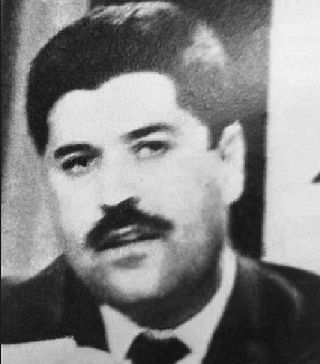
Salah Jadid was a Syrian military officer and politician who was the leader of the far-left bloc of the Syrian Regional Arab Socialist Ba'ath Party, and the country's de facto leader from 1966 until 1970, when he was ousted by Hafez al-Assad's Corrective Movement.

Salah al-Din al-Bitar was a Syrian politician who co-founded the Baʿath Party with Michel Aflaq in the early 1940s. As students in Paris in the early 1930s, the two formulated a doctrine that combined aspects of nationalism and socialism. Bitar later served as prime minister in several early Ba'athist governments in Syria but became alienated from the party as it grew more radical. In 1966 he fled the country, lived mostly in Europe and remained politically active until he was assassinated in Paris in 1980 by unidentified hitmen linked to the regime of Hafez al-Assad.

Nureddin Mustafa Ali al-Atassi was a Syrian politician who served as the 17th president of Syria from February 1966 to November 1970.

The Alexandria Protocol was an agreement signed on 7 October 1944, in Alexandria, by five Arab countries agreeing to the formation of a joint Arab Organization, which led to the formation of the eight-member League of Arab States in the following year.

The 1966 Syrian coup d'état refers to events between 21 and 23 February during which the government of the Syrian Arab Republic was overthrown and replaced. The ruling National Command of the Arab Socialist Ba'ath Party were removed from power by a union of the party's Military Committee and the Regional Command, under the leadership of Salah Jadid.

Ministry of Foreign Affairs and Expatriates is a cabinet ministry of Syria, responsible for conducting foreign relations of the country. The ministry oversees the expression of Syrian foreign policy, the protection of the interests of the Syrian nations and the interests of Syrian citizens abroad, as well as the representation of the country to other countries and international organizations. The responsibilities of the Ministry of Expatriates were merged on 14 April 2011.

The 1963 Syrian coup d'état, labelled in Ba'athist historiography as the "March 8 Revolution", was the seizure of power in Syria by the military committee of the Syrian Regional Branch of the Arab Socialist Ba'ath Party. The planning and the unfolding conspiracy of the Syrian Ba'athist operatives were prompted by the Ba'ath party's seizure of power in Iraq in February 1963.

Munif al-Razzaz was a Jordanian-Syrian physician and politician who was the second, and last, Secretary General of the National Command of the Arab Socialist Ba'ath Party, having been elected to the post at the 8th National Congress held in April 1965.

Mansur al-Atrash was a Syrian politician and journalist. Together with fellow university students, Atrash became a founding member of the Ba'ath Party and its Syrian regional branch in 1947. During the presidency of Adib Shishakli (1951–54), he became an anti-government activist and was imprisoned twice, only to be released in an unsuccessful attempt by Shishakli to gain the support of Atrash's father, Sultan. In the year Shishakli was overthrown, Atrash was elected to parliament and turned down an offer to serve in Said al-Ghazzi's government. During the period of the United Arab Republic (1958–61), Atrash became a strong supporter of Egyptian president and pan-Arab leader Gamal Abdel Nasser. He opposed Syria's secession from the UAR and turned down offers to serve in successive separatist governments in protest.

Major General Muhammad Umran was a Syrian military officer and founding member of the Military Committee of the unitary Ba'ath Party. He was a leading figure in Syrian politics from the 1963 Syrian coup d'état until the 1966 coup d'état.

Salim Hatum was a Syrian military officer and politician who played a significant role in Syrian politics in the 1960s. A member of the Syrian Regional Branch of the Arab Socialist Ba'ath Party, he was instrumental in the 1966 Syrian coup d'état that toppled the government of Amin al-Hafiz, also a Ba'athist. That same year he launched an insurrection from his home region of Jabal al-Druze against his colleagues who formed the new government but sidelined him from any major position. He fled Syria amid a warrant for his arrest, but returned in 1967 and was subsequently jailed and executed.

Sami Droubi was a Syrian politician, career diplomat, writer, translator, university professor and philosopher. He worked as a Syrian diplomat throughout the 1960s, serving, succession, as the Syrian ambassador to Brazil, Morocco, Yugoslavia, and Egypt and the Arab League, Spain and the Holy See. He briefly served as Education Minister in 1963. He also translated numerous literary works into Arabic.
This article details the history of the Arab Socialist Ba'ath Party from its founding in 1947 to its dissolution in the 1960s.

The First Salah al-Din al-Bitar Government ruled Syria from March to May 1963. The Cabinet of Syria was led by then-Prime Minister Salah al-Din al-Bitar. This government was the 60th since Syria gained independence from the Ottoman Empire in 1918 and the country's first Baathist government.

The Second Salah al-Din al-Bitar Government ruled Syria from May to August 1963. The Cabinet of Syria was led by then-Prime Minister Salah al-Din al-Bitar. This government was the 61st since Syria gained independence from the Ottoman Empire in 1918.

The Third Salah al-Din al-Bitar Government ruled Syria from May to October 1964. The Cabinet of Syria led by then-Prime Minister Salah al-Din al-Bitar. This government was the 62nd since Syria gained independence from the Ottoman Empire in 1918.

The First Amin al-Hafiz Government ruled Syria from November 1963 to May 1964. The Cabinet of Syria was led by then-Prime Minister Amin al-Hafiz. This government was the 63rd since Syria gained independence from the Ottoman Empire in 1918. It was formed on 12 November 1963 by Decree No. 1424 issued by the NCRC and dissolved on 13 May 1964.

The Fourth Salah al-Din al-Bitar Government ruled Syria from May to October 1964. The Cabinet of Syria led by then-Prime Minister Salah al-Din al-Bitar. This government was the 73rd since Syria gained independence from the Ottoman Empire in 1918.

The Second Amin al-Hafiz Government ruled Syria from October 1964 to September 1965. The Cabinet of Syria led by then-Prime Minister Amin al-Hafiz. This government was the 65th since Syria gained independence from the Ottoman Empire in 1918. It was formed on 4 October 1964 by Decree No. 905 and dissolved on 22 September 1965 by Decree No. 2127.

The First Yusuf Zuayyin Government ruled Syria from September 1965 to December 1965. The Cabinet of Syria led by then-Prime Minister Yusuf Zuayyin. This government was the 72nd since Syria gained independence from the Ottoman Empire in 1918. It was formed on 23 September 1965 by Decree No. 2128 and dissolved on 21 December 1965 by Decree No. 2836.















